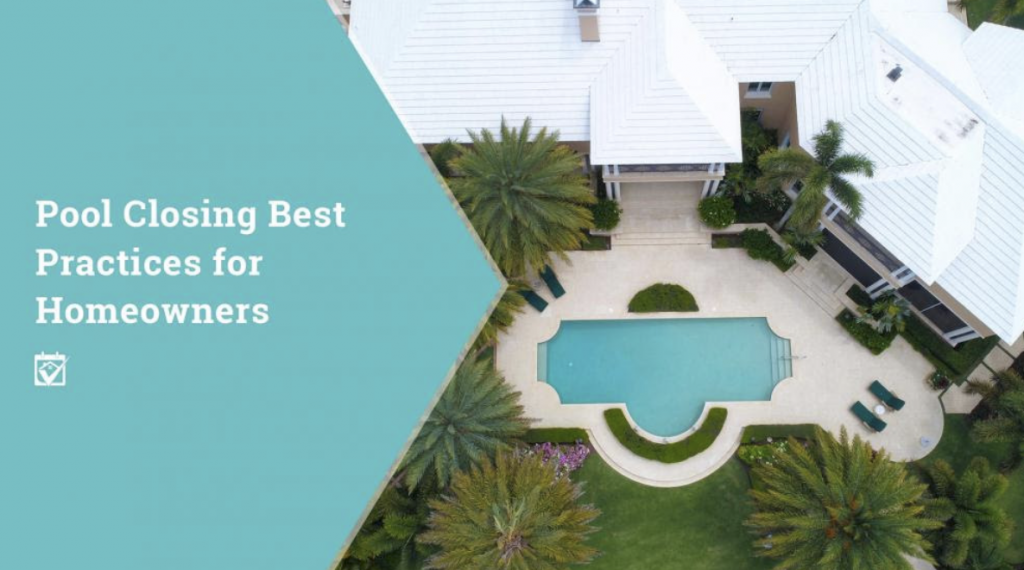
When you bought the house with the pool, it looked like it was going to be all fun in the sun and splishin’ and-a splashin’, but now that the first signs of fall are appearing (the emergence of Pumpkin Spice signals just three more weeks of summer), it’s time to figure out how to protect that pool through the winter.
As you might imagine, a pool that freezes is a pool that’s got a pretty big problem. There’s a lot you can do to prevent this and ensure that your pool is a fun summer oasis for many years to come.
Before You Start Closing, Consider Your Climate
Depending on where you live, you may need to take further or lesser measures to protect your pool through the winter. Your goal, ultimately, is to keep that pool and its systems from experiencing any sort of freezing. A frozen pipe, a frozen filter, anything like that could be a very expensive replacement in the spring when you open your pool again.
If you know for a fact that it never gets below 50 degrees Fahrenheit where you live, for example, you might not want to close your pool all the way. But, if it freezes frequently and there’s lots of snow, well, you’re going to have to break out bigger firepower. This is meant as a general guide to pool closing, that being said, your mileage may vary.
Pool Closing Made Easy
Closing a pool isn’t that big of a deal if you have all the right tools and materials on hand. It can be a complicated situation, though, because of all the parts that you’ll need to check as you go. Take your time, keeping in mind the risk of freezing in your area versus the cost to replace the frozen component, and you’ll be ok.
These are the necessary basic steps to closing a pool in a middling sort of climate:
Step 1: Deep clean your pool. Vacuum the entire pool, brush the walls, skim the surface, remove any and all debris. This way you’re starting fresh again in the spring.
Step 2: Test the water. Check that your pool is properly balanced before you put it to bed. This means a pH between 7.2 and 7.8 and alkalinity between 80 and 120 parts per million. If you’re running toward the high sides of these ranges, that’s ok. Check the hardness, too, since calcium deposits can form in your equipment over time.
Step 3: Shock the pool. Shocking the pool right before closing will help it stay as clean as possible over the winter. A 15 minute fast dissolving shock treatment is absolutely fine since you won’t be using the pool again. If you have chronic algae problems, a winter algaecide will be a good addition. Use the same dose as is listed on the bottle for opening the pool.
OPTIONAL: Many pool owners skip the manual adjustments and use a winter closing kit to prepare their water for the long dark march of winter. If you choose to go this way, read the instructions carefully. Some require you run the filter, others do not.
Step 4: Time to plug it up. Remove the eyeball fitting on your return line and plug it with an appropriate plug. Remove the skimmer basket and put it into storage. You can leave the skimmer in the pool if you use a winter skimmer cover to protect it from accumulating water. With a skimmer cover, you can also leave more water in the pool, rather than having to drain the pool below the skimmer level.
Step 5: Protecting the moving parts. The pump, chlorinator and all the hoses (including the skimmer hose) need to be drained and brought inside to prolong their lives and protect them from the cold. Filters should also be winterized according to the type you have installed and kept indoors.
Step 6: Put the cover on. Start by inflating your air pillow, then tossing it toward the middle of your pool. If you have a hard pool cover or are otherwise concerned about the water level, this is a good time to lower it a bit. Cover the pool and, when needed, install a winter cover pump to keep water from accumulating on the pool’s cover.
That’s all there is to it! You can totally do this — piece of cake.
Closing in on Winter and Your Pool’s Still Open?
It’s time to call in some backup. The last thing you want is to have to replace all your pool equipment because of a deep freeze. Fortunately, your Re/Max At The Lake family is here to help. Give us a call and we’ll find recommended pool pros who can quickly close your pool while you’re at work. Your Realtor trusts them, you know you can, too!



